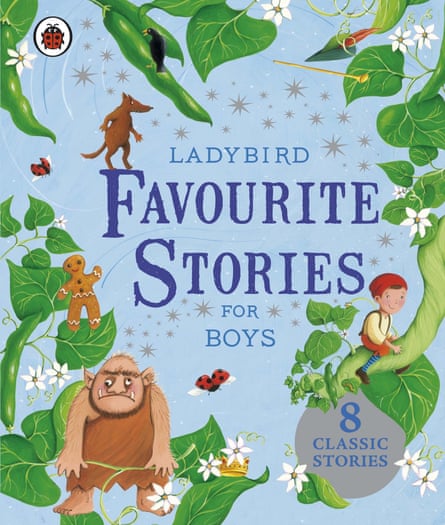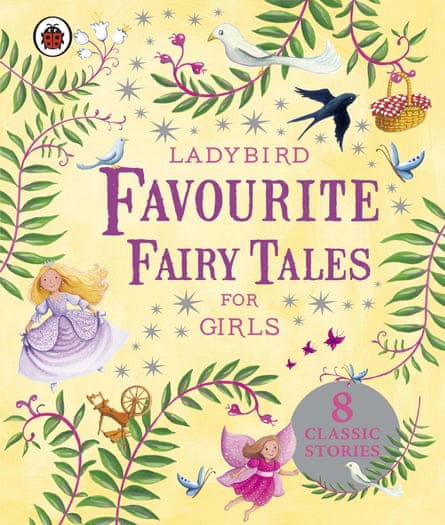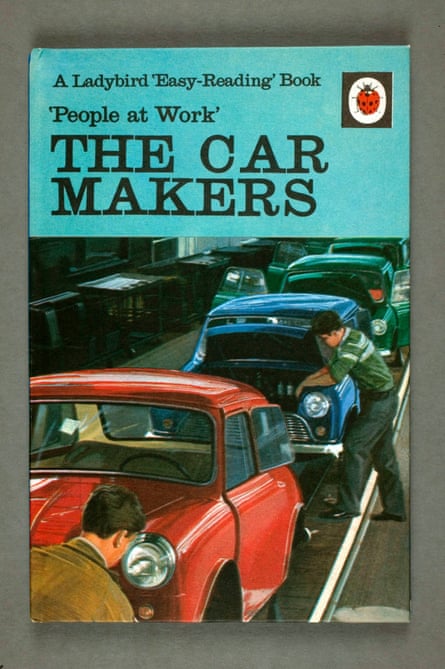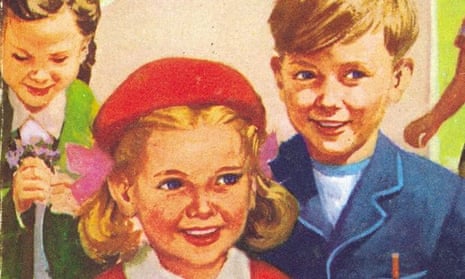Ladybird, the iconic publisher of children’s books including the classic Peter and Jane reading scheme, has vowed to remove any “boy” or “girl” labels from its books because it doesn’t want “to be seen to be limiting children in any way”.
The publisher, which is due to celebrate its centenary next year, is the latest to sign up to the Let Books be Books campaign, which argues that labelling books with titles like The Beautiful Girls’ Book of Colouring or Illustrated Classics for Boys sends the message “that certain books are off-limits for girls or for boys, and promotes limiting gender stereotypes”.
Ladybird’s gendered titles include 2011’s Favourite Fairy Tales for Girls and Favourite Stories for Boys, the former claiming that “the mix of princesses, fairies and classic characters is perfect for little girls everywhere”, and including stories such as Cinderella and Sleeping Beauty, the latter that “the lively mix of adventurous heroes, dastardly creatures and classic characters is perfect for boys everywhere”, and including Jack and the Beanstalk and the Three Little Pigs.

Ladybird said that it only had six titles with “this kind of titling”, and told campaigners that “following discussions, should any of the titles you mention be reprinted for the trade we will be removing this labelling”.
“At Ladybird we certainly don’t want to be seen to be limiting children in any way. Out of literally hundreds of titles currently in print, we actually only have the six titles you cite … so I do feel we offer a vast range for children and their parents,” the publisher told campaigners, adding that its parent company, the huge Penguin Random House children’s division, would also be following its new stance. “As Ladybird is part of the Penguin Random House Children’s division, our commitment to avoiding gendered titles in the trade crosses all our imprints.”
Campaigners believe that “a good book should be open to anyone, and children should feel free to choose books that interest them”. Their petition to children’s publishers has gathered thousands of signatures, as well as the support of authors from Neil Gaiman to Joanne Harris. Gaiman has said that “Books are for people. Stories are for people. Limiting that is foolish and short-sighted”; Harris that “what may seem to be a harmless marketing strategy, is, to an impressionable child, really a form of brainwashing, repeating the false message that boys are brilliant and brave, while girls are mostly just decorative”. Malorie Blackman, who said that “part of reading for pleasure is letting our children and young adults choose the books they want to read for themselves”, and Anne Fine adding that “it’s a serious matter because it does narrow children’s sense of what they’re allowed to do or like, in a horrible, horrible way”, are also supporters of the campaign.

Heather Crossley, Ladybird’s publisher, said: “We would hate to be seen to be limiting imaginations in any way and I don’t feel we do that. The signposting of ‘for boys’ and ‘for girls’ was initially to make it easier for purchasers, for example for grandparents buying gifts. A lot of publishers have done that in the past. But we feel we have titles which can be enjoyed by both genders, so it makes sense to take the labelling off … I know if a boy found his favourite title happened to be in the girls’ collection, he wouldn’t be too chuffed.”
The publishers Miles Kelly, Chad Valley, Usborne, Parragon and Dorling Kindersley – part of Penguin – have all confirmed they will not publish any more boy or girl titles, while Waterstones has also thrown its support behind campaigners. The stationer Paperchase committed in the summer to removing its Boys Activity Pad and Girls Activity Pad from sale.
“At Miles Kelly, we value and produce high-quality content that’s suitable for both boys and girls, and agree that both genders should simply be encouraged to read, whether they like vampire stories, dinosaur facts or classic fairytales! We think kids should be able to choose freely what interests them, so we have removed gendered messages from four of our books. We have no plans to publish any new gendered titles in the UK,” said Amanda Askew, marketing director at Miles Kelly.
Two publishers, Buster Books and Igloo Books, have yet to respond to Let Books Be Books’ calls to remove their gendered titles. Buster declined to comment further on Thursday, having told the Guardian in March that “when you have a colouring book which is specifically for a boy or a girl, it sells three times as many copies as one without the sexual categorisation”; Igloo Books did not respond to a request for comment.

Tricia Lowther from Let Books Be Books said: “We are delighted that Ladybird has joined the ranks of publishers who have agreed to Let Books Be Books and that this commitment extends to the Penguin Random House Children’s division too. It’s great that they have recognised these titles can be limiting for children. Hopefully those few remaining publishers of gendered titles will realise that children deserve more than gender stereotypes.”
The campaigners are now turning their sights on Christmas, and on urging those shopping for presents to avoid taking the gendered route. “It’s always better to buy based on what a child is interested in rather than by assumptions of what they might like based on their gender. There’s no good reason for children’s books to be packaged as for boys or girls – don’t let marketers limit children’s horizons by saying otherwise. A good book is for anyone,” said Lowther, pointing shoppers towards “inclusive” retailers such as the online book retailer Letterbox Library, and the News from Nowhere Bookshop in Liverpool, and asking the public to nominate more using the hashtag #Toymark on Twitter.

Comments (…)
Sign in or create your Guardian account to join the discussion